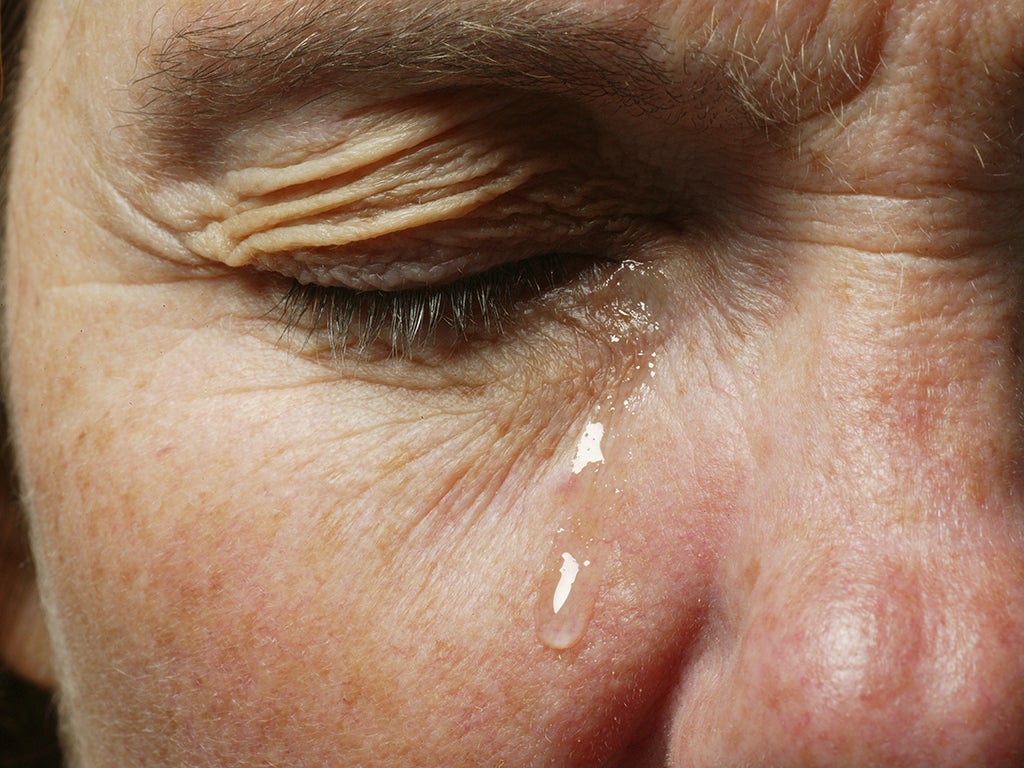Why do we cry? The science of tears
Happy, sad, crocodile or from onions, Dr Nick Knight explains the scientific reasons behind sobbing

Your support helps us to tell the story
From reproductive rights to climate change to Big Tech, The Independent is on the ground when the story is developing. Whether it's investigating the financials of Elon Musk's pro-Trump PAC or producing our latest documentary, 'The A Word', which shines a light on the American women fighting for reproductive rights, we know how important it is to parse out the facts from the messaging.
At such a critical moment in US history, we need reporters on the ground. Your donation allows us to keep sending journalists to speak to both sides of the story.
The Independent is trusted by Americans across the entire political spectrum. And unlike many other quality news outlets, we choose not to lock Americans out of our reporting and analysis with paywalls. We believe quality journalism should be available to everyone, paid for by those who can afford it.
Your support makes all the difference.[This article was first published in 2018]
With the post-gym sweat still drying on my neck, beer in one hand and screw-driver in other, I felt surprisingly masculine for a boy who moisturises.
How is it then, that 30 seconds of a television documentary about a cat befriending an old blind dog, produces that fatal ‘watery glaze’ over my eyes, and suddenly, desperately unable to rescue the situation, I have a tear in my eye.
Crying is part of our human emotional package – love it, or hate it. Of course, women are definitely better at it than men, with the number of cries per year estimated at 50 and 10, respectively.
It begs the questions how does it all work, and what triggers our waterworks when we are both sad - and happy? Get your tissues at the ready, it’s all about tears this week.
Crying can be scientifically defined as the shedding of your tears in response to an emotional state; very different from ‘lacrimation’, which is the non-emotional shedding of tears. With that said, your plumbing apparatus that makes your tears is all the same.
So before I dazzle you with the fact that we have more than one type of tear, let us explore the science of tear production and how it links to the emotional centre of your brain. To do this, we are going to use the classic example: the break-up.
“What do you mean it’s over?” you whimper, quivering lip in full frenzy.
With the ‘beginning of the end’ of the relationship, the production of your tears can begin. It is all down to your lacrimal system (think of it like your inbuilt Thames Water supply) that sits next to your eyeball. It is both a secretory system that produces your tears, and an excretory system, that drains them.
When a tear is produced from the lacrimal gland that sits in-between your eyeball and eyelid, you spontaneously blink, spreading the tear as a film across your eye. Your tear then has two fates; firstly it can drain-off down the lacrimal punctum, like the sink plug in your kitchen, subsequently draining through your nose (hence why your nose runs when you cry).
Of course in this break-up, you are having a really good old sob, and so your lacrimal drainage system simply cannot deal with the volume of tears. The resultant excess fluid now cascades over your eyelids and down your cheeks – for your ex-partner to bear witness to and begin to feel really, really bad.
Of course, your body being the incredible feat of engineering that it is, you don’t just make one type of tear - you make three: basal, reflex and psychic tears. Your basal tears are what I like to call the ‘worker tears’ and they keep your cornea (the transparent front of your eye) nourished and lubricated so your eyes don’t dry out. Then there are your reflex tears which that help you to wash out any irritations to your eyes from foreign particles or vapours (onion, being the classic example).

Finally, there are the ones we all know about, and that are florid in your current break-up scenario - the psychic, or ‘crying’ tears. These are the tears produced in response to that strong emotion you may experience from stress, pleasure, anger, sadness and suffering to indeed, physical pain. Psychic tears even contain a natural painkiller, called leucine enkephalin – perhaps, part of the reason why you might feel better after a good cry!
So here you are - floods of tears cascading onto old photos of you and your ex together, ‘your song’ playing on repeat - but how does your in-built shower-system link to these emotions? Well, there is an area of your brain specifically to deal with your emotions, called the limbic system (specifically the part of it called the hypothalamus), which is hard-wired into your autonomic nervous system (that’s the part you don’t have any control over). This system, via a neurotransmitter called acetylcholine, has a degree of control over the lacrimal ‘tear’ system; and it is this tiny molecule which then stimulates tear production. So in short, your emotional reaction to the break-up triggers your nervous system, which in turn, orders your tear-producing system to activate.
What is the point of them though? Is it as simple as an expression in response to a stimulus, as some suggest, or a more complex primal call out - a form of non-verbal communication to elicit help and support from those around you in your time of need? There are some psychologists who believe you feel better after a cry because of this social input, solidifying of relationships with those sharing in the experience, and collaborative helplessness. How often we see this displayed in the Hollywood movies when the friends rally around the dispatched.
Your crying can even be divided into spatial - and temporal-types; the former being when you cry over wanting to be somewhere e.g. home, versus the latter which is about looking into the past or the future and eliciting an emotion e.g. that one week anniversary with your now, ex. One study even suggested an evolutionary role of crying as a means of displaying vulnerability or submission to an ensuing attacker. Perhaps if you had pre-empted the break-up you could have started the tears early and quelled any potential break-up!
Now the interesting thing about crying is that it doesn’t just make your face wet, or your non-waterproof mascara become a form of combatant face paint. It in fact has a whole host of other effects; your heart rate increases, you sweat, your breathing slows and you can get a lump in your throat – known as the globus sensation. This all occurs as a result of your sympathetic nervous system (that’s your ‘fight or flight’ system) activating in response to your break-up situation – and any psychic tear-producing one for that matter.

Now before we wrap up I wanted to just tell you a fun fact about the origin of crocodile tears. You know the ones - those insincere, fake tears that people can sometimes display, such as the Z-list celebrity getting off charges in court - again. They originate from the ancient Greeks who had an anecdote in which crocodiles would pretend to weep while luring their prey in. Clever crocodile, I say.
When it come to those still fresh in the world, babies use crying more than just a means of emotional expression but as a form of communication to us grown ups. After all they are fairly limited in how they can express themselves! It may surprise you to know (and it definitely did me) that there are three types of baby cry - the basic, angry and pain cry.
So now you know why, apart from your break-up, why that tear-jerker movie, friend that made you laugh so hard you cried, and unsuspectingly discovered nostalgic photo of a past grandparent, brings a tear to your eye.
Tears are a positive representation of who we are. It demonstrates not only our deep emotional connections with our world – past, present, and future – but allows us to visibly celebrate that fact. They are also scientifically proven to make you feel better. So go on and wear your tears with pride.
If you are concerned though, that you are too tearful, too quickly, for no reason or you have worries over your mood, your GP will always be happy to chat with you in confidence. Now where’s that handkerchief…
Dr Nick Knight is a junior doctor based in London with a PhD background in human performance. His blog on life as a doctor can be read at: https://drnickknight.wordpress.com/
Or follow him via Twitter: @Dr_NickKnight

Join our commenting forum
Join thought-provoking conversations, follow other Independent readers and see their replies
Comments